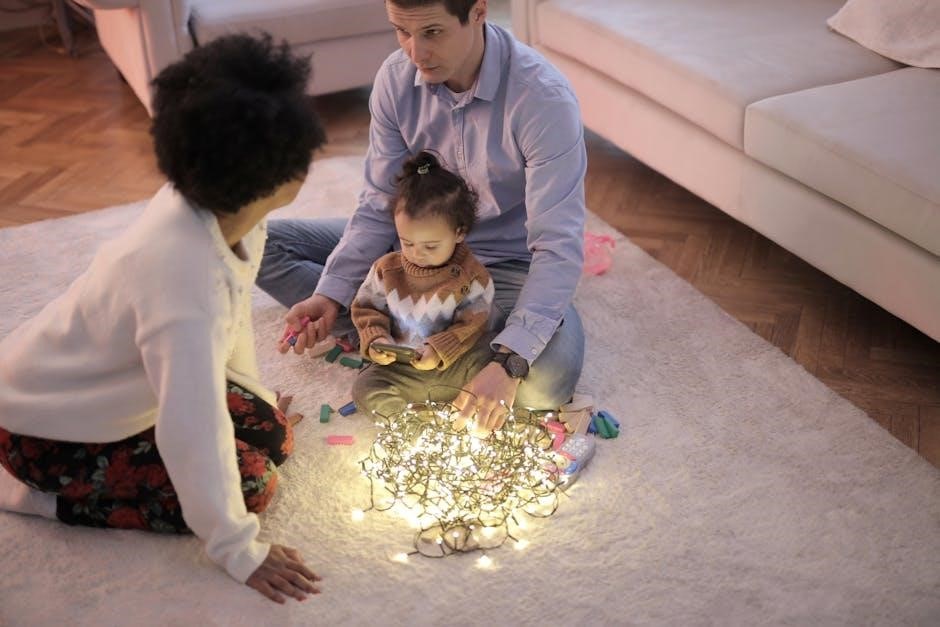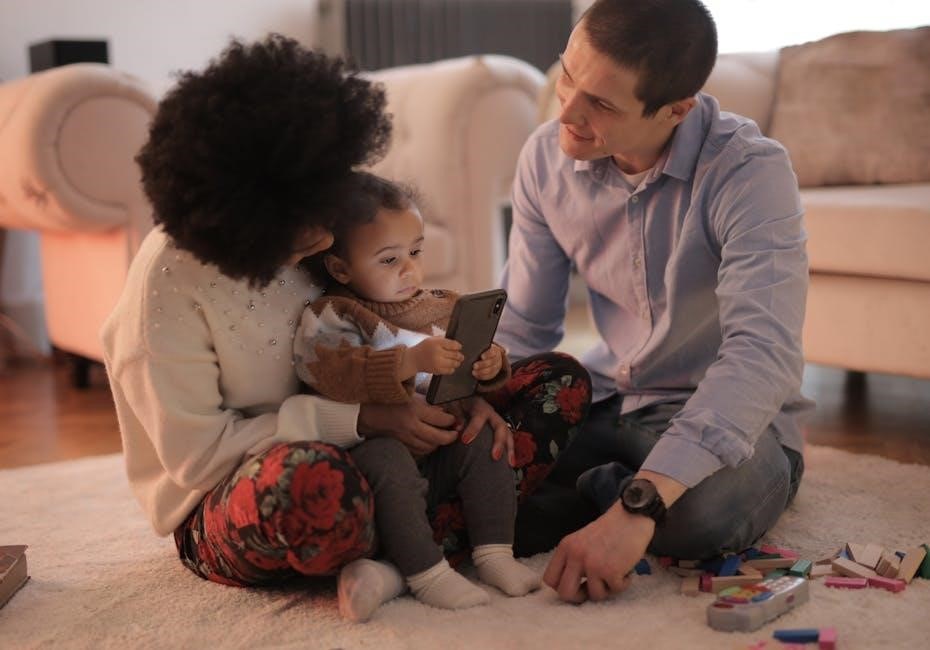Talking with your toddler is a crucial period for language development. Engage your child with simple strategies like reading, storytelling, and responsive conversations to foster verbal interaction. Consistent communication boosts IQ, language skills, and emotional bonds, laying the foundation for lifelong learning and connection.
Why Communication is Key in Early Childhood Development
Effective communication is essential for a toddler’s cognitive, social, and emotional growth. It helps children understand their surroundings, express emotions, and develop problem-solving skills; Early conversations enhance vocabulary and comprehension, laying the groundwork for future academic success. Moreover, communication fosters a strong emotional bond between parent and child, building trust and self-confidence. Research shows that engaging with toddlers through talk can significantly boost their IQ and language abilities. By encouraging verbal interactions, parents empower their children with lifelong communication skills that are vital for personal and professional relationships. Investing time in talking with your toddler is an invaluable gift for their development.

The Importance of Language Skills for Toddlers
Language skills are fundamental for toddlers, enabling them to express thoughts, emotions, and needs effectively. Developing strong language abilities early on enhances cognitive growth, memory, and problem-solving skills. It also fosters social interactions, helping toddlers build relationships and understand cultural norms. Research indicates that toddlers with advanced language skills tend to perform better academically and exhibit better emotional regulation. Additionally, language proficiency boosts self-confidence and independence, empowering children to navigate their world more effectively. Encouraging verbal communication from an early age ensures a strong foundation for lifelong learning and social success, making it a critical aspect of early childhood development.
Understanding Toddler Language Development
Toddler language development progresses from babbling to forming words and sentences. Exposure to conversation and interactive play significantly influences their ability to communicate effectively and understand language structure.
Stages of Language Development in Toddlers

Toddlers progress through distinct language stages, beginning with babbling around 6 months, followed by first words at 12 months, and short sentences by 18-24 months. Each stage builds on the previous, fostering vocabulary expansion and grammatical understanding. Parents play a vital role by engaging in conversations and using interactive activities to encourage verbal exploration. Consistent exposure to language through reading, storytelling, and responsive interactions accelerates development. Understanding these milestones helps parents identify typical progress and address any potential delays early, ensuring a strong foundation for future communication skills.
How to Recognize and Support Language Delay
Recognizing language delay in toddlers involves monitoring milestones like babbling by 6 months, saying first words by 12 months, and forming short sentences by 24 months. If a child shows limited vocabulary, struggles to combine words, or has difficulty understanding simple instructions, it may indicate a delay. Parents can support development by engaging in interactive play, reading daily, and encouraging communication through questions. Consulting a speech therapist for tailored strategies can also address delays effectively, ensuring the child receives the necessary support to thrive linguistically and socially.

Strategies for Effective Communication
Engage toddlers with active listening, simple language, and open-ended questions to foster verbal interaction. Encourage independence and use imaginative play to enhance language development naturally and effectively.
Active Listening and Responding to Your Toddler
Active listening is essential for fostering a strong bond and encouraging language development. When your toddler speaks, give them your full attention, maintaining eye contact and a warm tone. Respond thoughtfully to their words, even if they are babbling or using gestures. This validation makes them feel heard and valued. Expanding on their utterances by adding a few words can enhance their vocabulary. For example, if they say “ball,” you can say, “Yes, that’s a red ball.” This interaction teaches them how conversations flow and builds confidence in their ability to communicate effectively. Consistency in this practice nurtures their linguistic skills and emotional growth.
Using Simple and Clear Language
Using simple and clear language is vital when communicating with your toddler. Speak in short, straightforward sentences and avoid complex words or long explanations. This helps your child grasp meanings more easily. For example, instead of saying, “Let’s go to the kitchen to get a snack,” say, “Let’s get a snack.” Pause between sentences to give them time to process and respond. Avoid jargon or overly elaborate phrases, as they can confuse your toddler. By keeping your language clear and direct, you create an environment where your child feels comfortable imitating and experimenting with words, fostering their language development effectively. Consistency in this approach strengthens their understanding and vocabulary over time.
Encouraging Verbal Interaction Through Questions
Asking questions is a powerful way to encourage verbal interaction with your toddler. Use open-ended questions that require more than a “yes” or “no” answer, such as, “What do you think will happen next in this story?” or “How did that make you feel?” This prompts your child to think critically and express their thoughts. Encourage creative thinking by asking, “What do you see in this picture?” or “What would you name this toy?” Always wait for a response, showing patience and genuine interest. Praise their efforts, even if their answers are simple, to build confidence. By making questions a part of daily conversations, you help your toddler develop the habit of expressing themselves effectively.

Interactive Activities to Boost Language Skills
Engage your toddler in activities like reading, singing, and imaginative play to stimulate language growth. These interactions foster vocabulary expansion and creative expression, enhancing communication skills naturally.
Reading Together and Discussing Stories
Reading with your toddler is a powerful way to enhance language skills and foster a love for learning. Choose books with vibrant images and simple narratives to capture their attention. As you read, pause to ask open-ended questions like, “What do you think will happen next?” or “How do you think the character feels?” Encourage your child to point to and name objects or characters in the story. After finishing the book, discuss the plot and characters, allowing your toddler to express their thoughts and imagination. This interactive approach not only builds vocabulary but also strengthens comprehension and communication abilities, making storytime a valuable bonding experience.
Singing Songs and Reciting Nursery Rhymes
Singing songs and reciting nursery rhymes are engaging ways to stimulate your toddler’s language development. These activities expose children to rhythm, rhyme, and repetition, which are essential for building phonological awareness. Choose simple, repetitive songs like “The Wheels on the Bus” or “Old MacDonald Had a Farm,” which encourage participation. Pause occasionally to let your toddler fill in missing words, fostering vocabulary expansion. Nursery rhymes, such as “Twinkle, Twinkle, Little Star” or “Humpty Dumpty,” introduce predictable patterns, making it easier for toddlers to anticipate and mimic language. These playful interactions not only enhance memory and auditory skills but also create joyful moments of connection, laying a strong foundation for future communication.
Engaging in Imaginative Play
Imaginative play is a powerful tool for fostering your toddler’s language development. By engaging in pretend scenarios, such as pretending to cook, shop, or care for a doll, your child learns to express thoughts and ideas. Encourage role-playing with props like toys, costumes, and utensils to spark creativity. Describe their actions and join in the play, using descriptive language to label objects and actions. For example, say, “You’re feeding the baby,” or “Look, we’re making coffee!” This interactive play helps toddlers connect words with meanings and practice storytelling skills. It also builds confidence and social skills, as they learn to communicate their ideas and collaborate with others. Make it fun and follow their lead to create meaningful conversations.
The Role of Parents in Language Development
Parents play a vital role in their toddler’s language development by acting as role models, engaging in conversations, and encouraging verbal interaction through various activities.
Being a Role Model for Effective Communication
Parents are their toddler’s first and most significant role models. By speaking clearly, using rich vocabulary, and engaging in meaningful conversations, parents demonstrate effective communication skills. Consistency in responding to a child’s attempts to talk reinforces language development. Parents should also model active listening, showing genuine interest in their toddler’s words. Expanding on a child’s utterances and adding new words encourages verbal growth. Being patient and encouraging creates a supportive environment for language exploration. Parents’ communication styles and interactions set the foundation for their child’s future language skills and social interactions. Consistent role-modeling fosters a lifelong love for communication and learning.
Creating Opportunities for Conversations
Creating opportunities for conversations with your toddler is essential for fostering their language development. Engage your child during daily routines like mealtimes, baths, or walks. Ask open-ended questions about their experiences, such as “What did you see at the park?” Encourage storytelling by sharing your own experiences and inviting them to do the same. Use interactive activities like puzzles or games to spark discussions. Respond to their gestures and words, even if they are incomplete, to show you value their input. Make eye contact and stay present during interactions to create a supportive environment for dialogue. These moments help build confidence and improve communication skills, laying a strong foundation for future conversations.

Recommended Books and Resources
Explore “Talking with Your Toddler” by Teresa and Laura Laikko for interactive games and “How to Talk So Kids Will Listen” by Adele Faber for effective communication strategies. Additional online resources offer workshops and guides to enhance your approach.
“Talking with Your Toddler” by Teresa and Laura Laikko
This book offers 75 engaging activities and interactive games designed to stimulate verbal communication in toddlers. Filled with practical strategies, it helps parents ignite their child’s language development through playful and meaningful interactions. The guide provides creative ways to encourage storytelling, expand vocabulary, and foster a love for communication. By incorporating these fun exercises into daily routines, caregivers can create a nurturing environment that supports their toddler’s speech growth. The authors emphasize the importance of consistency and patience, making it an invaluable resource for parents seeking to enhance their child’s language skills and build a strong foundation for lifelong learning.
“How to Talk So Kids Will Listen” by Adele Faber and Elaine Mazlish
This book provides practical strategies for effective communication with children, focusing on mutual respect and connection. Aimed at parents of children aged 2-7, it offers solutions to common challenges, such as refusal to cooperate or emotional outbursts. The authors share techniques like acknowledging feelings, offering choices, and using encouragement instead of praise. Available on Amazon, it has become a trusted resource for fostering healthy communication habits. By applying these methods, parents can create a supportive environment where their child feels heard and understood, promoting emotional intelligence and lifelong communication skills. This guide is a must-have for any parent seeking to improve their relationship with their child.
Additional Online Resources for Parents
Several online platforms offer valuable tools and guides for parents seeking to improve their toddlers’ language skills. Websites like HowToTalkSoKidsWillListen.com provide workshops, apps, and expert advice on communication. PBS Kids and Understood.org also offer practical tips, interactive activities, and expert webinars. These resources cover topics such as encouraging verbal interaction, addressing developmental delays, and fostering a nurturing environment. Many platforms provide downloadable guides, videos, and forums where parents can share experiences. Utilizing these resources can empower parents with the knowledge and strategies to support their toddlers’ language development effectively, ensuring a strong foundation for future communication skills and emotional growth.
Talking with your toddler fosters intellectual growth, emotional bonds, and language mastery. Early communication lays the groundwork for lifelong learning and confident expression, enriching their future interactions.

Summarizing the Benefits of Early Communication
Early communication with toddlers enhances language skills, cognitive development, and emotional bonds. It fosters curiosity, problem-solving abilities, and social interaction. Talking actively stimulates brain development, improving memory and attention. Engaging in conversations builds self-confidence and independence, preparing children for future academic and social success. Consistent interaction strengthens parent-child relationships, creating a supportive environment for growth. By prioritizing early communication, parents lay a strong foundation for lifelong learning and effective expression, empowering their toddlers to thrive in all aspects of life.
Encouraging Lifelong Language Development
Consistent and engaging communication with toddlers nurtures a lifelong love for language. By fostering an environment rich in verbal interaction, parents empower their children to develop strong expressive and receptive skills. Reading, storytelling, and responsive conversations stimulate curiosity and creativity, laying the groundwork for advanced literacy. Encouraging independent expression builds confidence and independence, while active listening and questioning enhance critical thinking. These early efforts create a robust foundation, enabling children to excel academically and socially. Investing time in language development during toddler years ensures a child’s ability to thrive in all areas of life, fostering a brighter, more articulate future.
